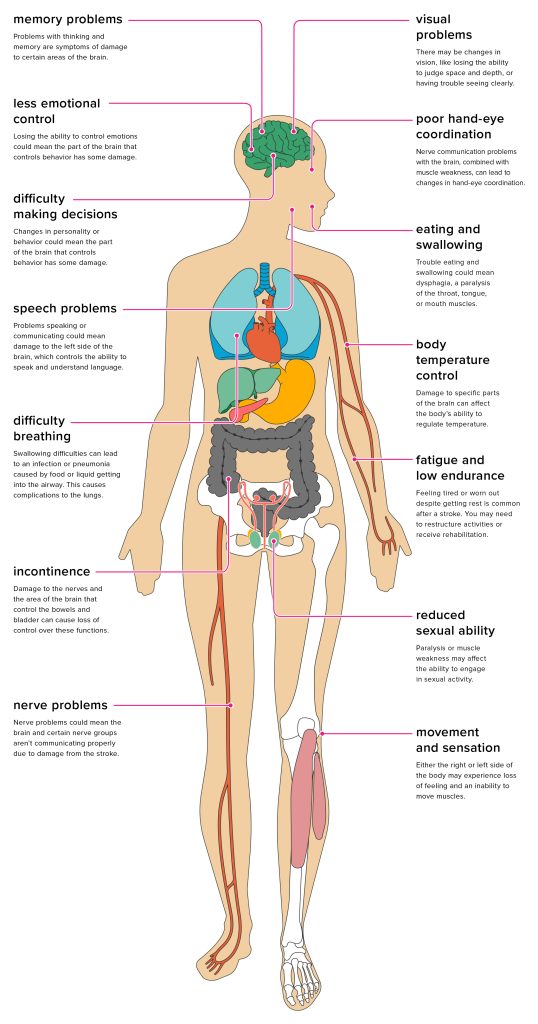Every year, hundreds of thousands of people around the world have a stroke, and many will experience communication problems as a result.
A stroke happens when blood carrying oxygen is unable to get to part of the brain. Brain cells get damaged and can die if left without oxygen even for a few minutes. A stroke requires immediate medical care, is potentially deadly, and can affect several parts of the body well after the event is over.
The best chance of reducing damage caused by a stroke is to get medical treatment as fast as possible. Long-term symptoms and recovery time will depend on what areas of the brain were affected.
Respiratory system
Damage to the area of your brain that controls eating and swallowing can cause you to have trouble with these functions. This is called dysphagia. It is a common symptom following a stroke, but often improves with time.
If the muscles in your throat, tongue, or mouth aren’t able to direct food down the esophagus, food and liquid can get into the airway and settle in the lungs. This can cause serious complications, like infection and pneumonia.
A stroke that happens in the brain stem, where your body’s vital functions — like breathing, heartbeat, and body temperature — are controlled can also cause breathing problems. This type of stroke is more likely to result in coma or death.
Nervous system
The nervous system is made up of the brain, spinal cord, and a network of nerves throughout the body. This system sends signals back and forth from the body to the brain. When the brain is damaged, it doesn’t receive these messages correctly.
You may feel pain more than normal, or when doing regular activities that weren’t painful before the stroke. This change in perception is because the brain might not understand the sensations, like warmth or cold, the way it used to.
Changes in vision can happen if the parts of the brain that communicate with the eyes get damaged. These issues can include loss of vision, losing one side or parts of the field of vision, and problems moving the eyes. There may also be processing issues, meaning the brain isn’t getting the right information from the eyes.
Foot drop is a common type of weakness or paralysis that makes it difficult to lift the front part of the foot. It can cause you to drag your toes along the ground while walking, or bend at the knee to lift the foot higher to keep it from dragging. The problem is usually caused by nerve damage and may improve with rehabilitation. A brace might also be helpful.
There is some overlap between the areas of the brain and their function.
Damage to the front part of the brain may cause changes in intelligence, movement, logic, personality traits, and thinking patterns. If this area is affected following a stroke it may also make planning difficult.
Damage to the right side of the brain can cause loss of attention span, focus and memory issues, and trouble recognizing faces or objects even if they’re familiar. It can also result in behavior changes, like impulsiveness, inappropriateness, and depression.
Damage to the left side of the brain can cause difficulty speaking and understanding language, memory problems, trouble reasoning, organizing, thinking mathematically/analytically, and behavior changes.
Following a stroke, you’re also at a higher risk of having a seizure. This often depends on the size of the stroke, the location, and its severity. One study showed 1 in 10 individuals can develop seizures after a strokeTrusted Source.
Circulatory system
A stroke is often caused by existing issues within the circulatory system that build up over time. These are often due to complications related to high cholesterol, high blood pressure, smoking, and diabetes. A stroke can be caused by bleeding, known as a hemorrhagic stroke, or blocked blood flow called an ischemic stroke. A clot typically causes blocked blood flow strokes. These are the most common, causing nearly 90 percent of all strokes.
If you’ve had a stroke, you are at a higher risk of having a second stroke or heart attack. To prevent another stroke, your doctor will recommend lifestyle changes, like eating healthy and being more physically active. They may also prescribe medications.
Your doctor will also recommend getting better control of any ongoing health problems like high cholesterol, high blood pressure, or diabetes. If you smoke, you will be encouraged to quit.
Muscular system
Depending on which area of the brain is damaged, a stroke can have an effect on a variety of different muscle groups. These changes can range from major to minor, and will usually require rehabilitation to improve.
A stroke normally effects one side of the brain. The left side of the brain controls the right side of the body and the right side of the brain controls the left side of the body. If there’s a lot of damage to the left side of the brain, you may experience paralysis on the right side of the body.
When messages can’t travel properly from the brain to the body’s muscles, this can cause paralysis and muscle weakness. Weak muscles have trouble supporting the body, which tends to add to movement and balance problems.
Feeling more tired than usual is a common symptom after a stroke. It’s called post-stroke fatigue. You may need to take more breaks between activities and rehabilitation.
Digestive system
During early stroke recovery, you’re typically not as active as usual. You may also be taking different medications. Constipation is a common side effect of some pain medications, not drinking enough liquids, or not being as physically active.
It’s also possible for the stroke to affect the part of your brain that controls your bowels. This can cause incontinence, meaning the loss of control over bowel function. It’s more common in the early recovery stages and often improves over time.
Urinary system
Damage from a stroke can cause a breakdown in communication between the brain and the muscles that control your bladder. When this happens, you may need to go to the bathroom more often, or you may urinate in your sleep, or while coughing or laughing. Like bowel incontinence, this is usually an early symptom that improves with time.
Reproductive system
Having a stroke doesn’t directly change how your reproductive system works, but it can change how you experience sex and how you feel about your body. Depression, a decreased ability to communicate, and certain medications may also decrease your desire for sexual activity.
One physical issue that can affect your sex life is paralysis. It’s still possible to engage in sexual activity, but you and your partner will likely need to make adjustments.












